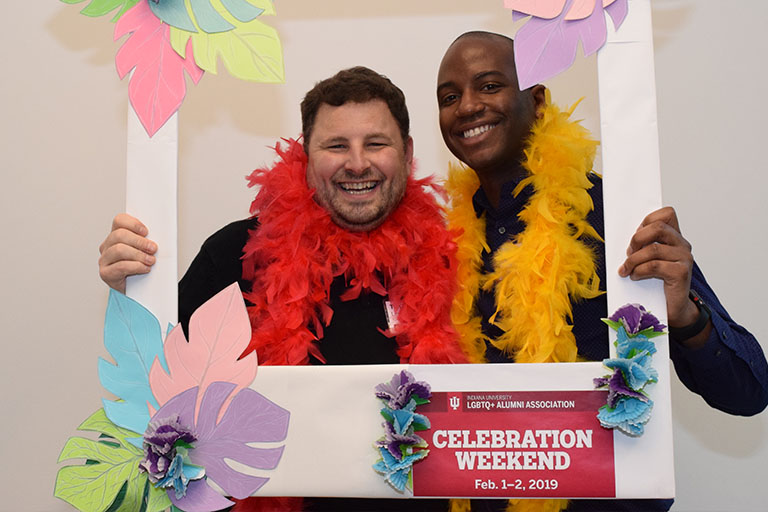For Doug Bauder, director of IU Bloomington’s LGBTQ+ Culture Center, personal stories are the true measure of the center’s success. At a recent gathering of the LGBTQ+ Alumni Association, he encountered one such story. During a silent auction that supported student scholarships through the center, a graduate student from Nigeria approached Bauder. After introducing himself, the student told him that it was because of the welcoming environment the LGBTQ+ Culture Center helps create that he chose to attend IU in the first place.
It is a story that Bauder has heard many times throughout his career at IU: the remarkable impact the university’s commitment to diversity and inclusion has made on LGBTQ+ students, faculty, and staff. Between the LGBTQ+ Culture Center, the Office of the Vice President for Diversity, Equity and Multicultural Affairs and offices throughout IU, Bauder said that the university’s commitment to supporting LGBTQ+ members of the community goes a long way in making the university a truly diverse and inclusive place.
“To come into a campus that honors this aspect of diversity is really significant,” Bauder said.
The value of this work spreads far beyond campus alone, and others are taking notice. Frequently, Bauder receives calls from other institutions looking to implement similar programs, often mystified at how a university in southern Indiana has become one of the country’s most welcoming institutions for the LGBTQ+ community. This work has also earned IU notable recognitions, including a spot on Campus Pride’s Best-of-the-Best LGBTQ-Friendly Colleges list. Most recently, this commitment has been recognized by College Consensus, which ranked IU Bloomington on its list of 25 top LGBTQ-friendly college campuses in the United States.
“It is an honor to be recognized by College Consensus as one of the top 25 LGBTQ-friendly campuses in the country,” said James C. Wimbush, vice president of Diversity, Equity and Multicultural Affairs, Dean of The University Graduate School, and Johnson Chair for Diversity and Leadership. “However, I am most excited by the work that this honor recognizes--the work being carried out by faculty, staff, and students across IU Bloomington to make sure our campus is safe and welcoming for all.”
Over time, supporting the LGBTQ+ community on campus has meant different things. In the past, college was the first space where students often felt comfortable enough to come out. However, as social attitudes have become more accepting, many students arrive at IU having come out earlier in their lives. However, members of the community still face difficulties, whether because of a conservative religious upbringing or a hostile community back home. For the LGBTQ+ Culture Center, which celebrates its 25th anniversary in the 2019-2020 academic year, meeting these needs has meant expanding programming and support to uplift members of the community in all stages of embracing their true selves.
Bauder is also grateful for the many university partnerships that help realize the vision of a welcoming campus for members of the LGBTQ+ community. For example, he said, in fall 2019, IU Bloomington will allow prospective students to include their sexual orientation and gender identity as part of the application process. Doing so will help the LGBTQ+ Culture Center connect students with resources and support before they ever set foot on campus.
Bauder noted that other resources, such as a newly released guide by IU’s School of Public and Environmental Affairs that offers resources for faculty and staff who are transitioning, as helping reinforce IU’s status as a truly welcoming campus. This welcoming environment is also reinforced by the Bloomington community, which holds long-standing events such as the Bloomington Pride Film Festival and Bloomington Pridefest each year.
At its core, Bauder said, the initiatives undertaken at IU and in the community are all about creating a safe and inclusive environment where members of the LGBTQ+ community can feel at home.
“It’s still about being open and at ease with one’s own identity,” Bauder said.


